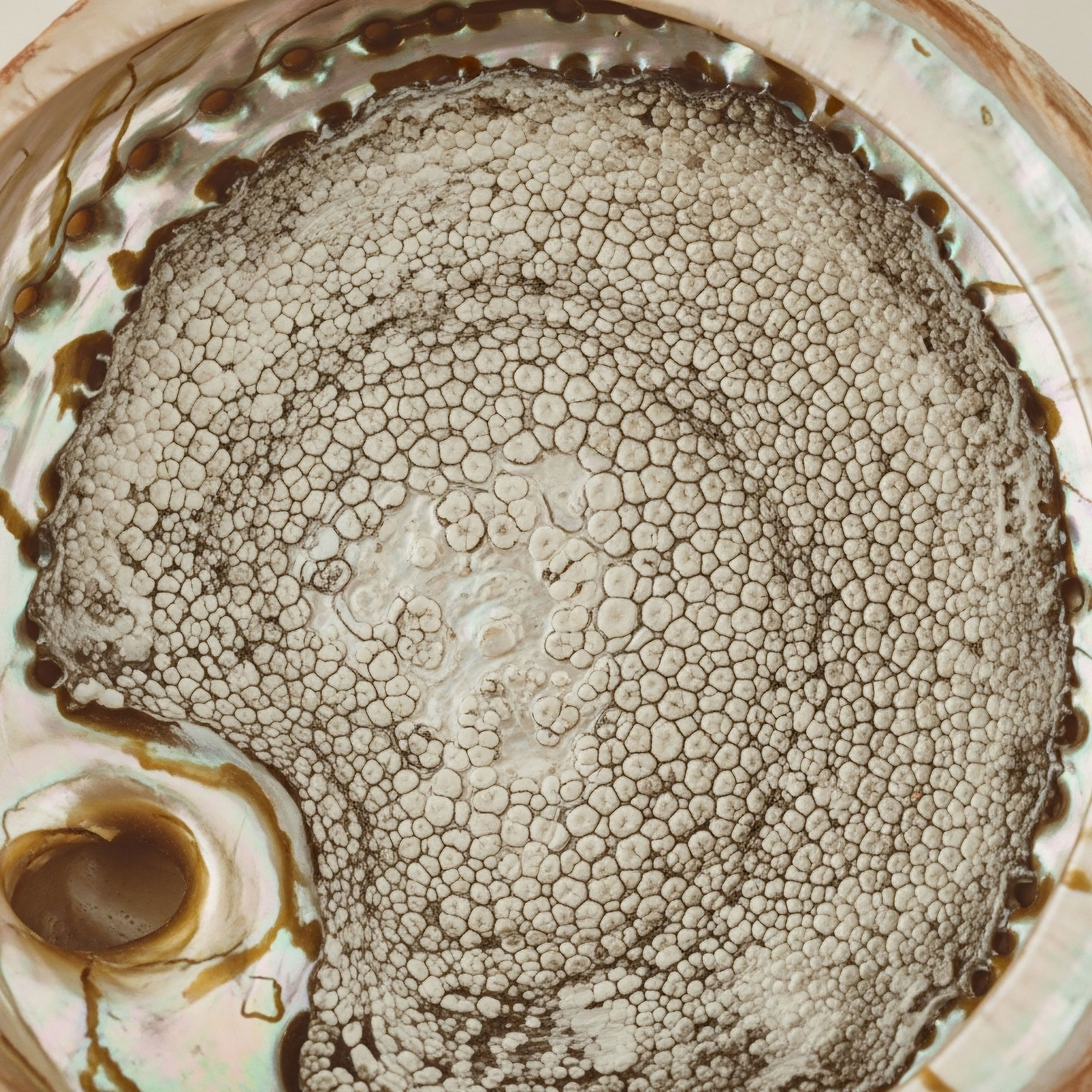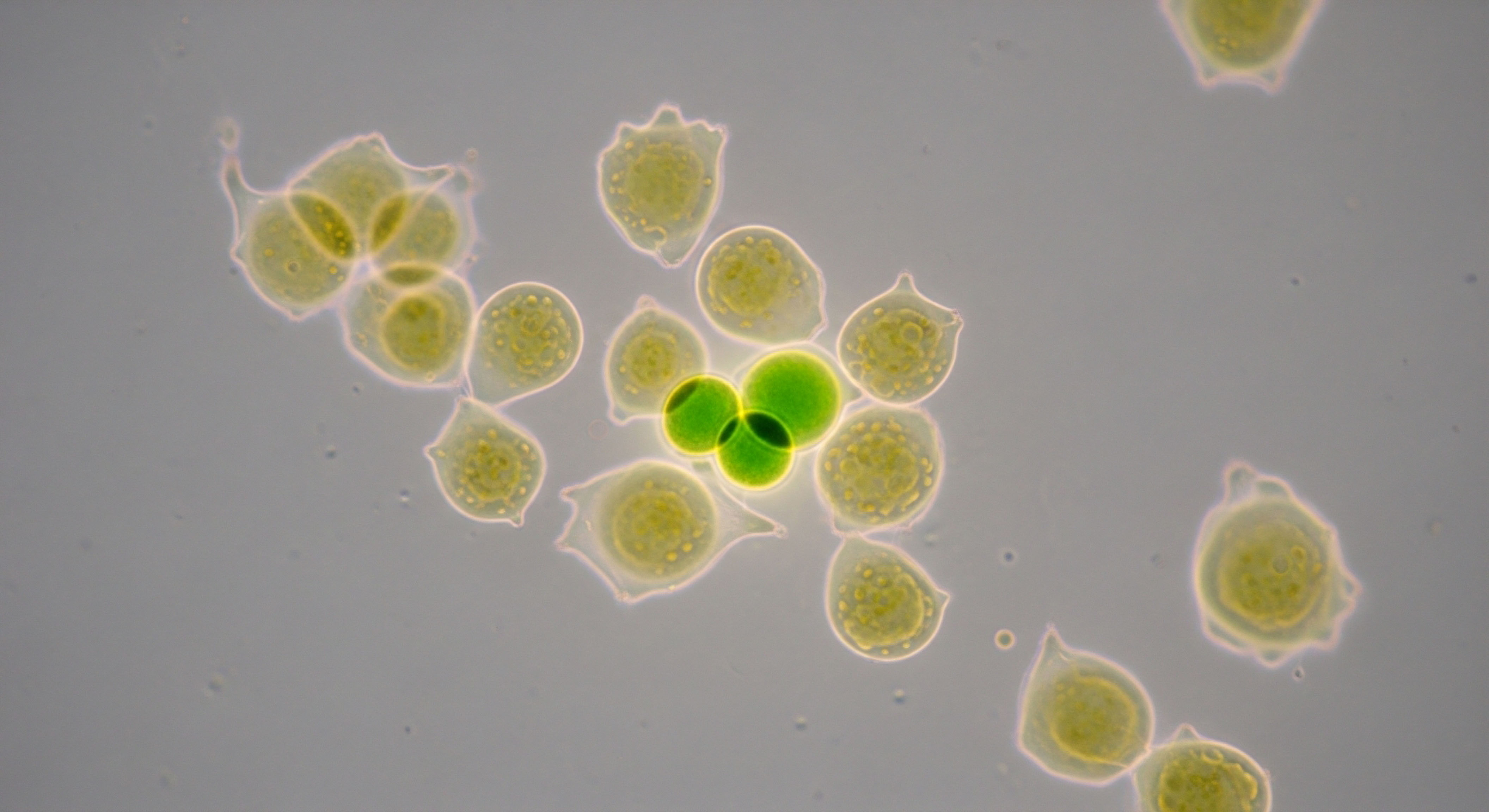

Fundamentals
You may be reading this because you feel a disconnect between how you live and how you feel. The energy that once defined your days has been replaced by a persistent fatigue, the mental sharpness you relied on has softened, and your body feels less responsive, less resilient.
When you hear about testosterone support, your thoughts might understandably turn to its effects on vitality, muscle, and libido. Yet, a deeper, more pressing question often follows what does this mean for the health of my heart in the long run? This question is born from a place of profound self-awareness and a desire to reclaim your well-being safely and sustainably.
The conversation about testosterone and cardiovascular health begins with understanding this hormone’s true role within your body’s intricate ecosystem. Testosterone is a primary signaling molecule that instructs tissues throughout your body. Its influence extends far beyond reproductive health, acting as a key regulator of your metabolic function.
Think of it as a systems-wide instruction manual for maintaining lean muscle mass, managing body composition, and ensuring efficient energy utilization. When these instructions are clear and consistent, the entire system benefits, including the heart and blood vessels.
A healthy cardiovascular system relies on strong, efficient tissues and balanced metabolic processes. Testosterone contributes directly to this state of equilibrium. It supports the development of lean muscle tissue, and the heart is a muscle.
It influences the way your body manages glucose, promoting insulin sensitivity and preventing the accumulation of visceral fat, the type of deep abdominal fat strongly linked to metabolic distress and cardiovascular strain. When testosterone levels decline, these foundational instructions weaken, which can lead to a gradual shift toward increased fat mass, reduced muscle, and less efficient energy metabolism. These are the very changes that place a cumulative burden on your heart over time.
Understanding testosterone’s role as a metabolic regulator is the first step in appreciating its connection to long-term cardiovascular wellness.
Your body is a network of interconnected systems. The endocrine system, which produces hormones like testosterone, is in constant communication with your cardiovascular system. This dialogue influences everything from blood pressure to cholesterol levels to the health of the blood vessel linings.
Therefore, addressing clinically low testosterone is an intervention aimed at restoring a fundamental part of this biological communication network. The goal of hormonal optimization is to re-establish the clear, powerful signals your body needs to maintain its own health, allowing your cardiovascular system to function within an environment of metabolic balance and strength.


Intermediate
As we move from foundational principles to clinical application, the focus shifts to the evidence and the specific protocols designed to ensure patient safety and efficacy. The question of long-term cardiovascular outcomes with testosterone support has been the subject of extensive clinical investigation. Recent, large-scale meta-analyses of randomized controlled trials provide a clear and reassuring picture, allowing us to base our understanding on robust data from thousands of patients.

Evaluating the Evidence on Major Cardiovascular Events
For many years, the cardiovascular safety of testosterone replacement therapy (TRT) was a topic of debate. Early studies sometimes produced conflicting results, creating uncertainty. However, comprehensive meta-analyses published in 2024, which synthesize data from numerous high-quality studies, have brought significant clarity.
These analyses consistently show that for men with diagnosed hypogonadism, TRT does not lead to an increased risk of major adverse cardiovascular events. Specifically, the incidence of myocardial infarction (heart attack), stroke, and death from cardiovascular causes was found to be statistically similar between men receiving TRT and those receiving a placebo.
One systematic review even suggested a potential benefit, finding a reduced risk of major cardiovascular events in men undergoing TRT, particularly those with pre-existing risk factors like metabolic syndrome or established cardiovascular disease. This finding points toward the mechanism we discussed earlier ∞ by improving metabolic parameters like insulin sensitivity and body composition, testosterone support may help mitigate the very factors that contribute to cardiovascular strain in the first place.
Modern clinical evidence from large-scale studies indicates that properly managed testosterone therapy does not elevate the risk of heart attack or stroke for men with hypogonadism.

Understanding Specific Clinical Considerations
A responsible clinical protocol is built on a foundation of careful monitoring and management of testosterone’s known physiological effects. While the data on major events is reassuring, a complete picture includes understanding all potential impacts. Two specific areas warrant close attention during hormonal optimization protocols.
- Hematocrit Monitoring ∞ Testosterone stimulates the production of red blood cells, a process known as erythropoiesis. This leads to an increase in hematocrit, which is the proportion of your blood composed of red blood cells. While beneficial for oxygen-carrying capacity, an excessively high hematocrit can increase blood viscosity. Therefore, regular monitoring of hematocrit levels is a standard and essential part of any TRT protocol to ensure levels remain within a safe physiological range.
- Cardiac Arrhythmia ∞ One 2024 meta-analysis identified an increased incidence of cardiac arrhythmias in men receiving TRT compared to a placebo group. The arrhythmias noted were generally not life-threatening, but this finding underscores the importance of a thorough cardiovascular evaluation before beginning therapy and ongoing dialogue with your clinician about any symptoms like palpitations. It highlights that while the overall picture is one of safety regarding major events, the hormone’s electrical influence on the heart is a key area of consideration.

The Structure of a Modern Protocol
A modern therapeutic protocol is designed to mimic the body’s natural hormonal environment while mitigating potential side effects. For men, this often involves weekly injections of Testosterone Cypionate. This is frequently paired with other medications to maintain systemic balance.
| Medication | Purpose | Typical Administration |
|---|---|---|
| Testosterone Cypionate | Primary androgen replacement to restore physiological levels. | Weekly intramuscular or subcutaneous injection. |
| Gonadorelin | Maintains testicular function and natural hormone production by stimulating the pituitary gland. | Twice-weekly subcutaneous injection. |
| Anastrozole | An aromatase inhibitor used to manage the conversion of testosterone to estrogen, preventing potential side effects like gynecomastia. | Twice-weekly oral tablet, dosed according to lab results. |
For women, protocols are tailored to their specific life stage, whether pre-menopausal, peri-menopausal, or post-menopausal. Low-dose Testosterone Cypionate injections or pellet therapy can be used to address symptoms like low libido and fatigue, often in conjunction with progesterone to ensure endometrial health and overall hormonal synergy.


Academic
An academic exploration of testosterone’s long-term cardiovascular outcomes requires moving beyond endpoint data into the realm of mechanism. The clinical findings from meta-analyses are the observable phenomena; the underlying physiology and molecular biology provide the explanation. The relationship between testosterone and the cardiovascular system is a complex interplay of genomic and non-genomic actions that influence vascular tone, cellular metabolism, inflammation, and cardiac electrophysiology.

Endothelial Function and Vasodilation
The endothelium, the single-cell layer lining all blood vessels, is a critical regulator of cardiovascular health. Endothelial dysfunction is a primary event in the pathogenesis of atherosclerosis. Testosterone exerts several beneficial effects on this vital tissue. It has been shown to promote vasodilation through both endothelium-dependent and endothelium-independent mechanisms.
One key pathway involves the increased synthesis of nitric oxide (NO), a potent vasodilator, by endothelial nitric oxide synthase (eNOS). Testosterone can also induce rapid vasodilation by modulating ion channel activity in vascular smooth muscle cells, an example of its non-genomic effects.

Metabolic Regulation and Anti-Inflammatory Effects
Low testosterone is strongly correlated with insulin resistance, visceral adiposity, and a pro-inflammatory state, all of which are independent risk factors for cardiovascular disease. Testosterone signaling through the androgen receptor influences gene expression related to lipid metabolism and glucose transport.
By improving insulin sensitivity and promoting a shift in body composition from fat mass to lean mass, testosterone directly counteracts the metabolic substrate of cardiovascular disease. Furthermore, androgens can modulate the immune system, reducing the production of pro-inflammatory cytokines like TNF-alpha and IL-1-beta, which are deeply implicated in the development of atherosclerotic plaques.
Testosterone’s influence on cardiovascular health is mediated through its direct effects on vascular endothelium, metabolic pathways, and inflammatory signaling.

What Are the Electrophysiological Mechanisms of Arrhythmia?
The finding of increased cardiac arrhythmias in some studies requires a deeper look into the heart’s electrical conduction system. Sex hormones are known to modulate cardiac ion channels, which govern the flow of potassium, sodium, and calcium ions that generate the cardiac action potential.
Testosterone has been shown to affect the duration of the action potential and the QT interval on an electrocardiogram. It can modulate specific potassium channels (like Kv4.3 and HERG) that are responsible for cardiac repolarization. It is biologically plausible that by altering the delicate balance of these ion currents, restoring testosterone levels in some individuals could create a substrate more susceptible to arrhythmias.
This effect is likely highly dependent on individual genetics, underlying cardiac structure, and the specific hormonal milieu, representing a key area for future research.

The Hematopoietic Axis and Hepcidin Suppression
The well-documented increase in hematocrit with testosterone therapy provides a clear example of its systems-level integration. The primary mechanism for this effect is the suppression of hepcidin, a peptide hormone produced by the liver that acts as the master regulator of iron availability. By suppressing hepcidin, testosterone increases the amount of iron available for erythropoiesis in the bone marrow, leading to a greater production of red blood cells. This table illustrates the direct pathway.
| Step | Biological Process | Clinical Outcome |
|---|---|---|
| 1 | Testosterone administration. | Supraphysiological or restored physiological androgen levels. |
| 2 | Suppression of hepatic hepcidin expression. | Increased iron transport out of storage cells. |
| 3 | Increased iron availability for bone marrow. | Enhanced erythropoiesis (red blood cell production). |
| 4 | Systemic increase in red blood cell mass. | Elevated hematocrit and hemoglobin levels. |
This pathway demonstrates the profound interconnectedness of the endocrine, hepatic, and hematopoietic systems. Clinically, it reinforces that managing testosterone therapy is an exercise in systems biology, requiring the clinician to anticipate and monitor these downstream physiological effects to ensure optimal and safe outcomes.

References
- Braga, Marcelo, et al. “LONG-TERM CARDIOVASCULAR SAFETY OF TESTOSTERONE-REPLACEMENT THERAPY IN MIDDLE-AGED AND OLDER MEN ∞ A META-ANALYSIS OF RANDOMIZED CONTROLLED TRIALS.” Journal of the American College of Cardiology, vol. 83, no. 13, 2024, p. 2685.
- Corona, Giovanni, et al. “Testosterone Replacement Therapy and Cardiovascular Risk ∞ A Review.” The World Journal of Men’s Health, vol. 36, no. 3, 2018, pp. 1-11.
- Ahmed, Muhammad, et al. “The Inverse Association between Testosterone Replacement Therapy and Cardiovascular Disease Risk ∞ A Systematic 20-year Review and Meta-Analysis of Prospective Cohort Studies up to 2023.” medRxiv, 2024.
- Jain, Vikash, et al. “Association between testosterone replacement therapy and cardiovascular outcomes ∞ A meta-analysis of 30 randomized controlled trials.” Progress in Cardiovascular Diseases, vol. 84, 2024, pp. 37-45.
- Saad, Farid, et al. “Testosterone as potential effective therapy in treatment of obesity in men with testosterone deficiency ∞ a review.” Current Diabetes Reviews, vol. 8, no. 2, 2012, pp. 131-43.

Reflection
The information presented here offers a map of the current clinical and scientific understanding of testosterone and cardiovascular health. It is a map drawn from data, from mechanisms, and from the collective experience of thousands of individuals. Your own health journey, however, is the unique territory.
The lived experience of your symptoms, your personal health history, and your future goals are what give this map meaning. Knowledge provides the coordinates and the compass, but the path forward is one you will walk yourself, in partnership with guidance that understands your specific terrain. Consider this knowledge the beginning of a new, more informed conversation about your own biological systems and the potential for their restoration.



